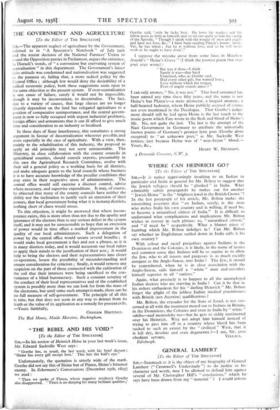" THE REBEL AND HIS VOID [Ti? the Editor of
THE SPECTATOR] Sta,—In his review of Heinrich Heine in your last week's issue, Mr. Edward Sackville West says : " Goethe has, as usual, the Iasi word, with his brief dictum : Heine has every gift except love.' This hits the bull's eye."
Unfortunately, the quotation is utterly wide of the mark. Goethe did not say this of Heine but of Platen, Heine's bitterest enemy. In Eckermann's Conversations (December 25th, 1825) we ,read :
" Then we spoke of Platen, whose negative tendency Goethe also disapproved. ' There is no denying his many brilliant qualities,'
Goethe said, ' only he lacks love. He loves his readers and his fellow poets as little as himself, and so we can apply to him the saying of the Apostle, " Though I speak with the tongue of men and angels and have not love, &c.," I have been reading Platen's poems lately. Yes, he has talent ; but he is without love, and so hew... al
never work as he ought to have done'."
I suppose the mistake arose from some lines in Matthew Arnold's " Heine's Grave " (I think the poorest poem that true poet ever wrote) " But was it thou—I think
Surely it was—that bard Unnamed, who, as Goethe said, Had every other gift, but wanted love ; Love without which the tongue Even of angels sounds amiss ? "
I can only answer, " No, it was not." That bard unnamed has been named any time these fifty years, and the name is not Heine's but Platen's—a mere aristocrat, a languid amateur, a half-hearted hedonist, whom Heine publicly accused of crimes not even mentioned in the Decalogue. That Goethe's judge- ment should still be laid upon Heine is the last touch to the ironic poem which Fate wrote in the flesh and blood of Heine's life. No, not quite the last. The last is the attempt of the Nazi Government in Germany to attribute the universally known poems of Germany's greatest lyric poet (Goethe alone excepted) to " an unknown poet," as Mr. Sackville West notices, •just because Heine was of " non-Aryan " blood,— Yours, &c.,






































 Previous page
Previous page